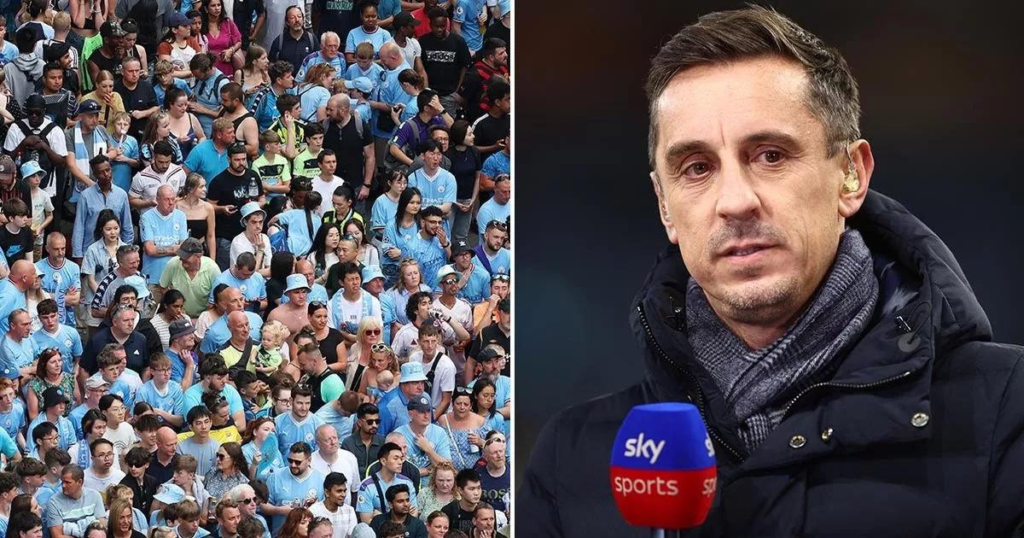Former Manchester United leader Gary Neville recently made a subtle criticism directed towards the owners of Manchester City for leveraging their businesses to sponsor the football club.
The recent 2022/23 season marked a significant milestone for the Blues under the guidance of Pep Guardiola, securing their maiden Champions League victory. Alongside this prestigious title, City clinched another Premier League championship and FA Cup, solidifying their dominance in European football.
These remarkable achievements were mirrored in the financial realm, with City revealing staggering revenue figures of £712.8 million in their November report. Such substantial income places them in the same echelon as Real Madrid, who recorded revenues nearing £720 million during the same period.
However, in a recent segment of The Overlap Fan Debate, facilitated by Sky Bet, Jamie Carragher expressed skepticism regarding the revenue claims made by Manchester City. During a discussion about the club’s financial standing, Carragher questioned the legitimacy of City’s proclaimed commercial revenue supremacy, stating, “When you see Manchester City claim they generate more commercial revenue than any other club in the world, that seems absurd – it just can’t be accurate. I’m not criticizing the club, but other supporters might raise eyebrows. Real Madrid boasts 14 European Cup victories – it’s hard to believe City could outpace them in revenue.”
A significant portion of City’s revenue stems from sponsorship deals with entities like Etihad Airways, which is under the ownership of Sheikh Mansour. This arrangement raises concerns about the ethical implications of utilizing business connections to bolster financial gains, particularly in light of Financial Fair Play (FFP) regulations.
When questioned about this practice, Neville, who is also a co-owner of Salford City in League
Two, drew attention to the substantial income City derives from sponsorships associated with their owners. He emphasized that such a strategy wouldn’t align with the principles upheld at Salford City. Speaking on The Overlap Fan Debate, Neville remarked, “At Salford City, we prioritize generating revenue through legitimate means. While we boast one of the highest commercial incomes in the league, we maintain a commitment to fair play, unlike some other clubs.”
Neville’s remarks highlight the ongoing debate surrounding financial transparency and accountability in modern football. While clubs seek to maximize revenue streams through various avenues, questions arise about the integrity of financial practices, particularly when owners’ business interests intertwine with club sponsorships.
This discussion extends beyond Manchester City, resonating with broader concerns about the commercialization of football and the potential for conflicts of interest. As clubs increasingly rely on corporate partnerships and sponsorships to sustain operations and compete at the highest level, ensuring adherence to ethical standards and regulatory frameworks becomes paramount.
The debate surrounding Manchester City’s financial model underscores the need for greater transparency and scrutiny within the football industry. As stakeholders, including fans, governing bodies, and media outlets, demand accountability, clubs must navigate the delicate balance between financial success and ethical conduct.
The bottom line
In conclusion, Gary Neville’s critique of Manchester City’s sponsorship practices serves as a reminder of the complexities inherent in modern football economics. While clubs aspire to achieve financial stability and success on the pitch, they must also uphold principles of fairness and integrity to preserve the sport’s integrity and reputation.
